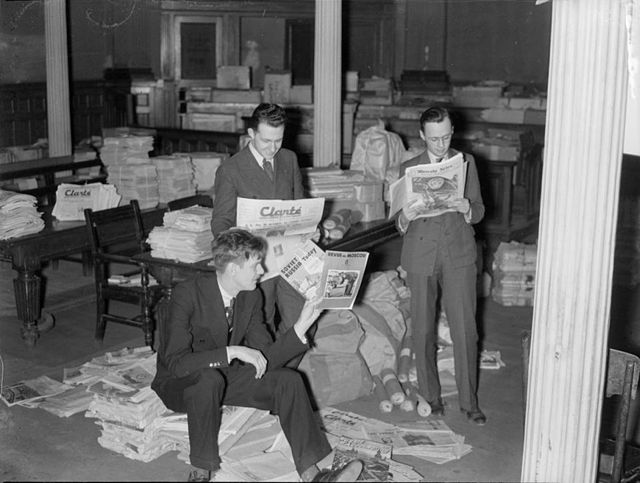Communist propaganda is the artistic and social promotion of the ideology of communism, communist worldview, communist society, and interests of the communist movement. While it tends to carry a negative connotation in the Western world, the term propaganda broadly refers to any publication or campaign aimed at promoting a cause and is/was used for official purposes by most communist-oriented governments. The term may also refer to political parties' opponents' campaign. Rooted in Marxist thought, the propaganda of communism is viewed by its proponents as the vehicle for spreading their idea of enlightenment of working class people and pulling them away from the propaganda of who they view to be their oppressors, that they claim reinforces exploitation, such as religion or consumerism. Communist propaganda therefore stands in opposition to bourgeois or capitalist propaganda.
"Comrade Lenin Cleanses the Earth of Filth" by Viktor Deni, 1920
Clock hand labeled "communism" about to cut off a top-hatted and brandy-nosed caricature head labeled "Capital" as the caption reads "The final hour!"
Communist propaganda in Cuba
Statue of Mao Zedong in Shenyang
The Act to Protect the Province Against Communistic Propaganda, commonly known as the "Padlock Law" or "Padlock Act", was a law in the province of Quebec, Canada that allowed the Attorney General of Quebec to close off access to property suspected of being used to propagate or disseminate communist propaganda. The law was introduced by the Union Nationale government of Maurice Duplessis and made it illegal to "use [a house] or allow any person to make use of it to propagate Communism or Bolshevism by any means whatsoever". This included printing, publishing or distributing of "any newspaper, periodical, pamphlet, circular, document or writing, propagating Communism or Bolshevism". Violations of the Act subjected such property to closure by the Attorney General, including the locking of access doors with padlocks, against any use whatsoever for a period of up to one year and any person found guilty of involvement in prohibited media activities could be incarcerated for three to thirteen months.

The doorway of the newspaper La Clarté, the French-language weekly of the Communist Party of Canada, padlocked by police in Montreal in 1937.
Men reading confiscated literature in Montreal City Hall, 1938.






